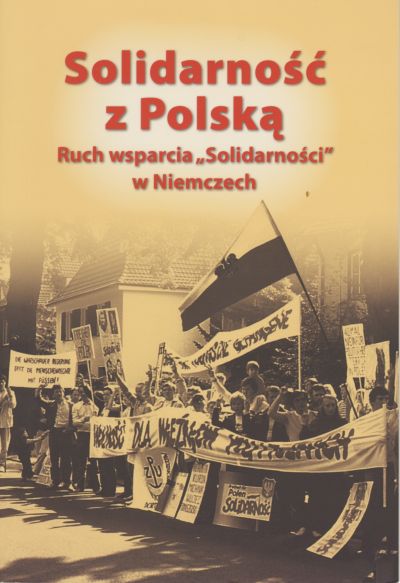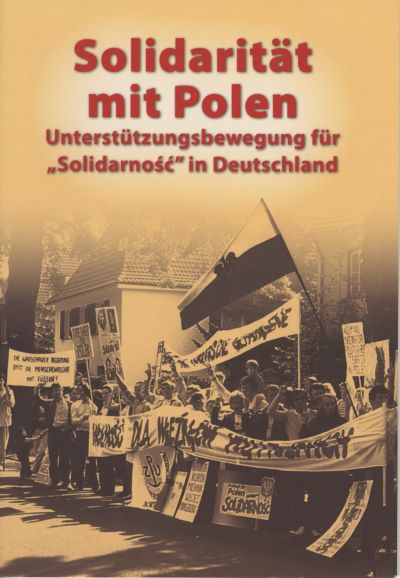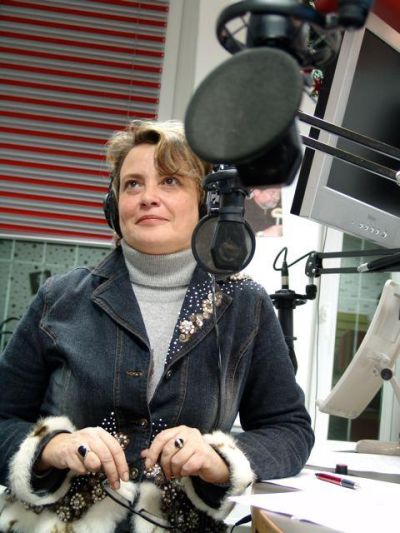The pro-Solidarność movement in Germany

On 3 November 1984, a funeral procession for the murdered priest Jerzy Popiełuszko marched through the streets of Berlin. The march had been announced by the “Solidarność” Society, the International Society for Human Rights (ISHR), the Young Union and the “Work Group 13 August” . On 13 December 1984, the SWG Cologne and AGS Eschweiler – Aachen, with the “Solidarność” Society from Berlin, the “Solidarność” Relief Committee from Mainz and the ChSWN Christian mission from Cologne organised a demonstration for the reinstatement of the NSZZ “Solidarność” in Poland.
From 6 to 13 May 1985, 26 people went on hunger strike in front of the Polish Embassy in Cologne to protest against the arrest of Władysław Frasyniuk, Bogdan Lis and Adam Michnik and the opening of court proceedings against them. The SWG Cologne, the PPS party, the ChSWN and the Dortmund group of the ZPU were also responsible for this initiative. Similar initiatives were held in London, Brussels, Paris, Oslo, Vienna and Chicago.
On 3 June 1985, the “Solidarność” Society in Berlin went public with a signed petition to the German Chancellor aimed at stopping continuing credit talks with the regime of the People’s Republic of Poland. On 24 May 1986, a demonstration was held in front of the Soviet Embassy in Bonn to appeal against the politics of the USSR and the consequences of the Chernobyl nuclear disaster. It was SWG Cologne that had had the idea for this initiative, which it also organised along with the ChSWN, the ZPU and the “KONTYNENT” Society. The SWG Eschweiler – Aachen also held a demonstration in front of the Polish Embassy in Cologne on 30 August 1987 demanding that the NSZZ “Solidarność” trade union be reinstated and that trade union freedoms be granted in Poland. The SWG Eschweiler – Aachen held further protests in front of the Embassy of the People’s Republic on 13 May and on 31 August 1988. These rallies also demanded that trade union freedoms be granted in Poland and that the NSZZ “Solidarność” be reinstated.
Meanwhile, the German public were kept updated on the situation in Poland, on the repression and on the resistance of the population. In this context, between 1983 and 1988, the Christian mission ChSWN also organised six peace marches to liberate the people that were held between Carlsberg and Hambach Castle, a symbolic place for the fight for democratic and national rights. Each march was accompanied by a symposium, which dealt with the conditions in Poland. On top of this, numerous information tables were set up in West Berlin, Munich, Frankfurt am Main, Cologne, Bonn and Aachen to distribute materials about the “Solidarność” trade union. Articles on the situation in Poland could also be read in German-language publications, including the information magazine of the PPS “Die Wende”, in the magazine “Meinung” of the “Solidarność” society in West Berlin and in the “Information Bulletin” of the “Solidarność” relief committee in Mainz.
The Juliusz Mieroszewski Club for free political thinking, which was founded in Munich in 1985 and counted a lot of employees from the Polish service of the Radio Freies Europa station amongst its number giving it a lot of insider knowledge, played an important role in communicating with the German public. The club carried out numerous initiatives, held meetings, put on exhibitions and lectures and prepared press briefings on the current situation in the People’s Republic of Poland. It was headed up by the well known author Włodzimierz Odojewski together with the representatives Adam Rosenbusch, Bogdan Żurek and Franciszek Kotliński, with Alina Grabowska as Secretary. The actress Barbara Kwiatkowska-Lass was also active in this club. In 2002, activities stopped.
In 1983, 45 of the supporter organisations that had sprung up spontaneously around the world on four continents joined the international alliance of organisations supporting the “Solidarność” trade union (CSSO). Among the various actions taken by this umbrella association, two in particular stand out. Firstly, the legendary donation of a million dollars which was “coerced from the US Congress, and secondly, the creation of an aid programme for the individual operating committees of Solidarność.
The cooperation of the Solidarność foreign supporter organisations in the CSSO was extremely important to the effectiveness of the Poland aid, with the transfer of funds to Poland being one of its easiest tasks. The import of printed products that were forbidden under the Communists was much harder. A very specific type of logistics was required to organise and carry out the transport of technical goods. The people who really went the extra mile in this respect included Mirosław Chojecki in France, Józef Lebenbaum and Marian Kaleta in Seden, Andrzej Świętek in Denmark and Andrzej Chilecki and Andrzej Wirga in Germany. Their services were always called on when printing and offset machines or reproduction equipment, devices for intercepting radio traffic of the militia (Milicja Obywatelska, (MO)) and the security services, radios and special jamming equipment were needed. Each support group maintained their own contact with Poland. The recipients of the deliveries included: the international office of “Solidarność” in Brussels, the “Solidarność” NSZZ, the Provisional Coordination Commission of the “Solidarność” trade union (Tymczasowa Komisja Koordynacyjna NSZZ Solidarność), the regional sections of Solidarność in Łódź, Central and Eastern Poland, Beskydy foothills, West Pomerania, Gdansk shipyard and Silesia-Dąbrowa, the Academic Information Centre of the Independent Student Association (Centrum Informacji Akademickiej NZS), Solidarność Walcząca branches in Wrocław, Katowice, Poznań, Solidarność Walcząca, the Confederation of an Independent Poland (KPN), the “Niepodległość” (Independence) and “Wola” (Will), groups of the wing of the PPS party of Józef Pinior, the Polish Independence Party (Polska Partia Niepodległościowa), the Citizens’ Committees in Tychy and Bielsko-Biała, the Citizens’ Committee of the trade union chair Lech Wałęsa, the functionaries Andrzej Słowik, Zbigniew Romaszewski, Romuald Szeremietiew, Marian Jurczyk, Leszek Moczulski, Stefan Bratkowski and Kornel Morawiecki and editorial offices of periodicals and information newsletters, including the “CIA – Centrum Informacji Akademickiej”, as well as editorial offices of newspapers and magazines, such as “Solidarność Podbeskidzia” (Beskydy foothills ), “Z Dnia Na Dzień” (Lower Silesia), “Solidarność Walcząca”, “INDEKS” (Kraków), “BIULETYN” (Kraków University of Economics), “Na Bieżąco” (Opole), “Jedność” (West Pomerania), “Obraz” (Szczecin), “Tygodnik Wojenny” and the news review “PWA – Przegląd Wiadomości Agencyjnych”.
In 1990, on the tenth anniversary of the “Solidarność” trade union, a CSSO congress was held in Aachen, at which the representatives of the pro-Solidarność movement came together with the representatives of the National Commission of the “Solidarność” trade union (Komisja Krajowa NSZZ Solidarność) and the representatives of the parliamentarian citizens’ club (Obywatelski Klub Parlamentarny). In the same year, the last president in exile Ryszard Kaczorowski presented the new, democratically elected President of the Third Republic, Lech Wałęsa, with the insignias of the President of the Second Polish Republic. This gesture brought the mission of the Solidarność supporter organisations abroad to an end.
Alexander Zając, June 2022
Additional information:
The Polish Club (Klub Polski) in Hamburg coordinated the relief efforts on site, with other organisations that were working towards independence being actively involved in its work. These included the Association of Polish Combatants (Stowarzyszenie Polskich Kombatantów (SPK)), the Hamburg party office of the PPS, the KPN and the wing that had broken off from the trade union Solidarność 80”. The club organised meetings with members of the opposition, such as Marian Jurczyk and Romuald Szeremietiew as well as demonstrations and protest initiatives. One of the best known activities was a demonstration in front of the Consulate of the Soviet Union, which was carried out on boats because the organisers did not receive permission to approach the Consulate building from the street. The club was led for a long time by Maksymilian Pelc. His successor was Arkadiusz Kulaszewski.
Information on the Internet about:
1. The Conference of Solidarity Support Organizations (CSSO)
http://en.wikipedia.org/wiki/Conference_of_Solidarity_Support_Organizations
2. The “Solidarność” Eschweiler – Aachen working group
http://pl.wikipedia.org/wiki/Arbeitsgruppe_%22Solidarno%C5%9B%C4%87%22_Eschweiler-Aachen_e.V. und http://www.dw.de/dw/article/0,,15584318,00.html
3. The Polish service of the Radio Freies Europa station
http://pl.wikipedia.org/wiki/Radio_Wolna_Europa




